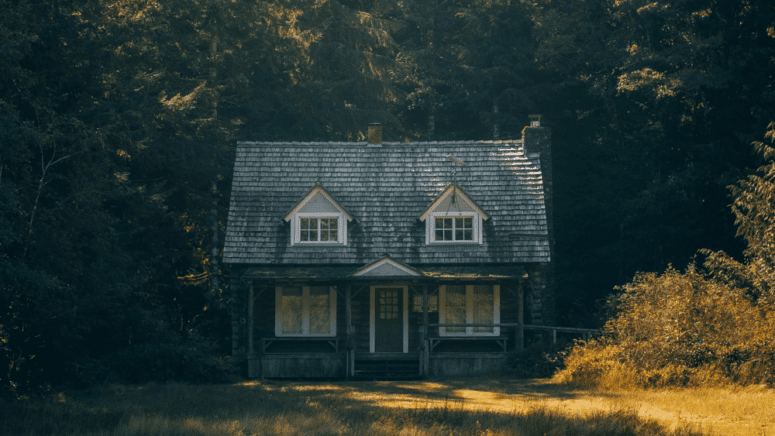How to Sell a Haunted House Like Any Other Home on the Market
- Published on
- 15 min read
-
Caroline Feeney, Former Executive EditorCloseCaroline Feeney Former Executive Editor
Caroline Feeney was previously HomeLight's Executive Editor / Director of Content. With 7 years of real estate reporting and editing experience, she previously managed content for Inman News and co-authored a book on real estate leadership. The Midwest native holds a master's from the Missouri School of Journalism and was formerly a real estate contributor for Forbes.
-
Sam Dadofalza, Associate EditorCloseSam Dadofalza Associate Editor
Sam Dadofalza is an associate editor at HomeLight, where she crafts insightful stories to guide homebuyers and sellers through the intricacies of real estate transactions. She has previously contributed to digital marketing firms and online business publications, honing her skills in creating engaging and informative content.
Ever wondered how to sell a haunted house? Believe it or not, that sale isn’t as doomed as you might think.
The reality is that Americans love the cheap thrill of gut-wrenching fear. Every year, hordes of Halloween enthusiasts lock arms and flock to their local house of horrors. These zombie-obsessed adrenaline junkies happily pay for a good scare, fueling a $300 million haunted attractions industry. Not surprisingly, more than half of prospective homebuyers would buy a haunted house.
Ask top real estate agents who’ve sold homes with the worst stigmas and rumors attached, and they say that selling a “haunted” house often lacks the drama, mystery, and fable of those manufactured fright nights. And you’d think the agents would want to play up the mystery and the folklore to attract more buyer attention.
But that’s not always the right move.
We chatted with the real estate agent who sold the infamous Los Feliz Murder House in Los Angeles, analyzed dozens of marketing materials and press around real-life haunted house sales, and looked up real estate disclosure laws around stigmatized homes in all 50 states.
What we found surprised us: If you want to sell a haunted house or a house tainted by murder stories, treat it like a matter-of-fact business deal, and the whole ordeal won’t be as scary as you think.
Here’s how to sell a “haunted” house:
Work with a low-drama real estate agent who isn’t in it for the press
There’s no getting around it — a house with a history of hauntings or deadly foul play generates attention, whether it’s a full-blown three-ring circus or whispers from surrounding neighbors.
The former was the case for Nancy Sanborn, a real estate agent in the LA area with over 40 years of experience, when she was hired in 2016 to sell what she thought was a regular old probate listing in a wealthy LA neighborhood.
The listing came as a referral, and as she says, “I did not know its history when I took it on, but everyone else did.” She got up to speed quickly with nothing but a Google search, which instantly showed the property had been the scene of an unusually grisly crime nearly 60 years before.
Inside the ominous estate, the troubled Dr. Harold Perelson had killed his wife with a hammer, struck his daughter in the head, and taken his own life. That was December of 1959, yet rumors swirled for decades to come.
As the story went, the Perelsons’ Christmas decorations — a tree and presents underneath — could still be seen there. Later, it was rumored that these items actually belonged to renters who lived in the house afterward.
There was no putting a lid on the publicity surrounding this listing. The mansion drew attention as a notoriously haunted attraction on the local murder mystery house tour, being dubbed as “LA’s most famous and mysterious murder house.” Some say they’ve seen Dr. Perelson’s ghost.
But rather than take press calls pouring in from around the world, Sanborn rolled up her sleeves and got to work. Rumors aside, the house was in terrible condition and needed a ton of preparation to be suitable for the market.
“We just treated it as best we could like a normal listing,” Sanborn told HomeLight. “The murder took place in the ‘50s, for goodness sake, and the rumor just stayed with the house. My obligation as an agent is to sell it for the most money possible, not to generate notoriety.”
Nevertheless, the house drew the biggest broker open caravan she’d ever seen and strange behavior from visitors with a morbid interest. Sanborn carried on and listed and marketed the house like any other, notifying the neighbors ahead of time so they could anticipate the extra street traffic and press attention.
Check your state’s disclosure requirements, and consult an attorney on any gray areas
Real estate disclosure laws, which set rules for what you have to tell buyers about a home before they follow through on the deal, are a mixed bag from state to state. But most states, in some shape or form, require sellers and their agents to disclose any “material defects” about a home upfront in writing.
According to the National Association of Certified Home Inspectors, material defects are those that negatively impact a home’s value or could pose an unreasonable risk to the buyers’ safety. Examples include a decayed exterior that exposes a home to the elements or a shoddy roof job that lets water seep in through the cracks.
Then, there are what’s called “material facts” about a home that might influence buyers’ decision on whether to purchase the house or how much they’d pay for it, such as the flood in the basement that happened three years ago.
Disclosure laws get murkier when it comes to telling buyers about facts that only have a “psychological impact” on the home, such as a murder, suicide, or rumored hauntings, but still may be considered “material” to a buyer’s decision.
We went to the real estate section of state government websites to dig up each individual state’s disclosure requirements around selling a stigmatized property, so you can see how the laws vary.
Disclosure requirements differ from state to state
The majority of states do not require sellers or their agents to disclose occurrences like homicides, felonies, suicides, or natural deaths that occurred on a property or any rumored paranormal activity associated with it. Some states even say a seller or agent cannot be held legally liable for failing to disclose such incidents or information.
In states that don’t require disclosure, an agent’s disclosure of sensitive information to the buyers without the seller’s permission may be considered a breach of ethics.
California has a unique law that requires that any death, even natural deaths, that occurred on the property within the last three years be disclosed. On the other hand, Alabama and North Dakota take a “caveat emptor” or buyer-beware approach.
This means the buyer is responsible for uncovering any stigmas associated with a property before they sign on the dotted line. However, many state laws also say that if a buyer asks point-blank about any rumors or history of the home, the seller or listing agent can’t lie.
Keep in mind that even if your state doesn’t require disclosure, it’s not so clear-cut. Many states also require that you disclose “adverse material facts” that could impact a property’s value, further muddying the waters.
Does a property’s history as the site of a violent crime constitute a material fact? You could argue it one way or another. It’s a gray area open to interpretation, especially when it comes to deaths and rumored hauntings.
Your agent should be familiar with your state’s disclosure requirements and statutes. But when in doubt, always consult a real estate attorney for advice on whether you should disclose something about your property’s history to cover all your bases and navigate any gray areas with care.
Real estate disclosures of psychologically impacted or stigmatized properties by state
Different states have specific guidelines for disclosing information about properties with a history of suicide, homicide, or paranormal activity. While many don’t require sellers to disclose these details, it’s essential to know your state’s rules. Click the map below to find out what your state mandates regarding these disclosures.
Alabama
Alabama follows the “Caveat Emptor” Rule, also known as buyer beware. This means buyers are responsible for inspecting the property before making a purchase. The seller and their agents are not obligated to reveal any defects unless specifically asked, except for issues that could pose health or safety risks to the buyers.
Alaska
As stated in AK Stat § 08.88.615, the seller or the agent must disclose any murder or suicide that happened within one year before the date the property is first shown to the buyer.
Arizona
AZ Rev Stat § 32-2156 protects Arizona sellers and real estate professionals from being held liable for failing to disclose that a property was the site of a natural death, suicide or homicide, or any other crime classified as a felony.
However, a court ruled in 2014 that the law does not protect against affirmative misrepresentations of facts about a property. In other words, although sellers may refuse to disclose, they shouldn’t lie about their reasons for selling a property.
Arkansas
According to AR Code § 17-10-101, no cause of action can arise against an owner or real estate agent for failing to disclose a property’s history of psychological impact, such as a homicide, suicide, or felony that occurred on site.
California
Per CA Civ Code § 1710.2, owners and agents must disclose deaths (and the manner of the death) that occurred in the home within the last three years, but any deaths that occurred before that do not require disclosure. The statute notes that owners and agents can’t claim immunity if they knowingly give a buyer false answers to direct questions.
Colorado
Facts or suspicions regarding circumstances that could psychologically impact or stigmatize property are not material facts subject to disclosure, and no cause of action can be brought against a real estate agent or broker for failing to disclose such a circumstance, according to CO Rev Stat § 38-35.5-101.
Connecticut
Under CT Gen Stat § 20-329dd, sellers and their agents are not required to disclose nonmaterial facts about a property, information that doesn’t affect its value or condition. They also cannot be held legally responsible for failing to disclose such details to a buyer.
Delaware
Per 24 DE Code § 2927, no cause of action can come against owners or real estate professionals for failing to disclose a property’s psychological impact. If a buyer requests information in writing (except for a history of diseases), the owner or agent must answer truthfully to the best of their knowledge.
Florida
According to the FL Stat § 689.25, sellers don’t have to inform buyers if a property was ever the site of a homicide, suicide, or other death. The law also protects real estate agents and other licensed professionals from being sued for not disclosing this information. Essentially, these facts aren’t considered material in a sale.
Georgia
GA Code § 44-1-16 protects owners, brokers, and agents from any legal action against them for failing to disclose a fact or suspicion that the property was the site of a homicide, felony, suicide, or death by accidental or natural causes. However, all parties must answer truthfully to specific buyer inquiries.
Hawaii
Based on HI Rev Stat § 508D-8, sellers don’t have to disclose if something happened on the property that didn’t affect the home’s structure, environment, or any of its improvements. This means only events that impact the physical condition of the property need to be shared with buyers.
Idaho
According to ID Code § 55-2801, no action can be taken against an owner or real estate professional for failing to disclose a property’s psychological impact history. A buyer may request in writing if the property is psychologically impacted.
The agent can then report any findings to the buyer with the owner’s consent. If the owner refuses to disclose, the agent must relay the non-disclosure message to the buyer.
Illinois
Per the Illinois Real Estate License Act, Section 15-20 and the Illinois Association of Realtors, a real estate professional isn’t liable for not disclosing that an event occurred on the property if it didn’t change its physical condition.
Indiana
Under IN Code § 32-21-6-6, property owners or agents aren’t obligated to reveal any information about a house being psychologically impacted. However, an owner or agent may not intentionally misrepresent a fact concerning a psychologically affected property in response to a direct inquiry from a buyer.
Iowa
There’s no statutory law in Iowa that explicitly requires owners or agents to disclose upfront the history of a psychologically impacted property or its associated stigmas, such as a death, murder, felony, paranormal activity, or suicide that occurred on the property.
Kansas
In Kansas, no law obligates sellers or agents to reveal a property’s history of stigmatizing events, such as deaths, murders, felonies, suicides, or alleged paranormal activity.
Kentucky
Kentucky doesn’t specifically mandate sellers or real estate agents to disclose information about a stigmatized property, including murder, suicide, or violent crime that occurred. However, sellers must answer any direct inquiries truthfully.
Louisiana
As indicated in LA Rev Stat § 37:1468, the fact or suspicion that a property was the site of a homicide, or other felony, or a suicide is not a material fact and therefore isn’t required to be disclosed in a real estate transaction.
Maine
Sellers can find the property condition disclosure requirements in 33 M.R.S. § 173. There’s no law obligating upfront disclosure of associated stigmas, such as a death, murder, felony, suicide, or alleged paranormal activity on the property.
Maryland
According to the MD Business Occupations and Professions Code § 17-322.1, events like a homicide, suicide, accidental death, natural death, or felony that occurred on the property are not a material fact relating to the property for sale or lease. Thus, agents may not be liable for failure to disclose such.
Massachusetts
As stated in MA Gen L 93 § 114, agents or sellers are not required to disclose death, homicide, or suicide. An alleged parapsychological or supernatural phenomenon on site is not deemed as material fact by state law.
Michigan
No state law explicitly requires agents or sellers to disclose upfront the history of a psychologically impacted property or its associated stigmas, such as a death, murder, felony, paranormal activity, or suicide that occurred on the property.
Minnesota
Under MN Stat § 513.56, there is no obligation to disclose if a property was the site of a suicide, accidental death, natural death, or reported paranormal activity.
Mississippi
According to MS Code § 89-1-527, the site of natural death, suicide, homicide, or felony crime (except for illegal activity that affects the property’s physical condition) isn’t a material fact that should be disclosed in a real estate transaction.
Missouri
MO Rev Stat § 442.600 law protects agents from any action being brought against them for failure to disclose a property’s history of psychological impact, such as whether it was the site of a homicide, other felony, or suicide.
Montana
Per MT Code § 37-51-102, Montana law does not consider the fact that a property was the site of a suicide or felony to be “material” and therefore does not require disclosure.
Nebraska
No state law explicitly requires agents or sellers to disclose upfront the history of a psychologically impacted property or its associated stigmas, such as a death, murder, felony, paranormal activity, or suicide that occurred on the property.
Nevada
According to NV Rev Stat § 40.770, a homicide, suicide, or any other type of death, unless caused by a property condition, is not considered a material fact in a real estate transaction. Therefore, sellers or agents are not required to disclose it.
New Hampshire
As indicated in NH Rev Stat § 477:4-e, agents and sellers are not obligated to tell a buyer that a property was the site of a homicide, other felony, or suicide, unless the buyer specifically asks about it.
New Jersey
According to NJ Admin Code 11:5-6.4, real estate agents are not required to disclose information about “psychological impairments,” including but not limited to a murder or suicide that occurred on the property, or rumors of the property being haunted.
However, there is a duty to disclose such incidents truthfully when a buyer makes a specific inquiry. Per Petrosino v. Ventrice, a “psychological impairment” may be so intertwined with the physical condition of the property that it must be disclosed.
New Mexico
Under NM Stat § 47-13-2, real estate agents and sellers will not be held liable for failure to disclose that a property was the site of a natural death, homicide, suicide, assault, sexual assault, or any other crime punishable as a felony.
New York
According to the NY Real Prop L § 443-A, real estate agents are not required to disclose death by natural or accidental causes, homicide, suicide, or any type of felony that occurred on a property. A buyer may submit a written inquiry for such information. The seller may choose whether or not to respond.
North Carolina
Death, illness, or conviction of certain crimes are not considered a “material fact,” per NC Gen Stat § 39-50.
North Dakota
This state follows the caveat emptor or “buyer beware” principle. If a buyer makes a specific inquiry about the home’s psychological impact history (such as a felony, murder, or suicide), the agent should pass along only what the owner tells them.
Ohio
There’s no state law explicitly requiring the disclosure of a property’s psychological impact history.
Oklahoma
According to 59 OK Stat § 858-513, agents and sellers are protected from legal liability for not disclosing that a property is psychologically impacted, such as being the site of a suicide, homicide, or other felony. However, a buyer can request such information in writing, and the seller’s agent can provide it with the seller’s consent. The seller can choose whether or not to respond to the request.
Oregon
Per OR Rev Stat § 93.275, sellers and agents aren’t required to disclose if a property was the site of a violent crime, suicide, or other death. The law also states that any event that doesn’t affect the home’s physical condition or title isn’t considered a material fact in a real estate transaction.
Pennsylvania
Neither statutory nor common law requires owners and real estate agents in Pennsylvania to disclose that the property was the site of a murder or suicide. Moreover, psychological damage is not considered a “material defect.” See Milliken v. Janoco (2013).
Rhode Island
The fact or suspicion that a property is psychologically impacted as the site of a homicide (or other felony) or suicide is not a material fact that requires disclosure, per RI Gen L § 5-20.8-6.
South Carolina
Under SC Code § 27-50-90, sellers don’t have to disclose if a property is considered psychologically impacted. This includes deaths that happened on the property or how those deaths occurred, and sellers can’t be held legally responsible for not sharing that information.
South Dakota
The disclosure statement requires the owner to disclose human death by homicide or suicide onsite, per SD Codified L § 43-4-44.
Tennessee
No course of action can be taken against an owner or real estate professional for failing to disclose a homicide, felony, or suicide that occurred onsite, per TN Code § 66-5-207.
Texas
According to TX Prop § 5.008, sellers and agents aren’t obligated to share if a death occurred on the property from natural causes, suicide, or an unrelated accident.
Utah
An owner is not required to disclose that their property is stigmatized, since it’s not a material fact, based on UT Code § 57-1-37.
Vermont
There’s no explicit requirement to disclose the psychological impact history of a property in statutory law or the real estate disclosure form. However, the Vermont Real Estate Commission states that any information a licensee reasonably believes could affect the property’s future use or value must be disclosed as a material fact.
Virginia
An owner or real estate agent cannot be held liable for failing to disclose a homicide, suicide, felony, or any act that did not affect the physical structure of the property, according to VA Code § 55.1-713.
Washington
Washington state has no statutory law that requires owners or real estate agents to disclose deaths or murders that occurred on a property.
West Virginia
In West Virginia, sellers and agents aren’t legally required to disclose whether a property was the site of a death or murder.
Wisconsin
Wisconsin law doesn’t require owners or agents to reveal occurrences on a property that did not affect its physical state or buildings, as stated in WI Stat § 452.23. However, the state disclosure form requires owners to answer the question, “Are you aware of one or more burial sites on the property?”
Wyoming
There’s no explicit requirement to disclose the psychological impact history of a property in statutory law or disclosure statement. However, according to Wyoming’s Property Condition Disclosure Act, “a condition, malfunction or problem that would have a materially adverse effect on the monetary value of the property” must be disclosed as defect.
Washington, D.C.
The Real Property Seller’s Disclosure Statement, as outlined in 17 DCMR §2708.13, does not require sellers to disclose property stigmas or any psychological impact from deaths or crimes that occurred on the site.
Err on the side of disclosure, experts advise
So now you know where your state stands. But in any case, Sanborn and real estate agents across the country advise taking a transparent, upfront approach in the sale of any stigmatized property to avoid opening the door to legal disputes down the line.
“Some people won’t buy a house that has had a death in it,” says Sanborn. “No matter what the disclosures are, I think something like that has to be disclosed.”
For one, there are few secrets in today’s internet age. DiedinHouse.com even lets you find out if anyone died at any valid U.S. address for only $14.99.
That’s not to mention, according to Sanborn, the neighbors who will come by after escrow and say, “Oh my god, did you hear about the murder in the house?” sending the buyer into a litigious flurry if they didn’t know.
And there is a right way and a wrong way to disclose these types of things. “This [Los Feliz] is not my only murder house by the way,” said Sanborn, who specializes in estates and trusts. “We don’t put a sign out ‘murder took place here,’” she explains.
You also don’t need to advertise the history in the listing description, but the listing agent may put a note such as “call listing agent for disclosures” in the multiple listing service (MLS) private remarks (only visible to agents, not the public).
Then, the buyer’s agent relays the information to their buyer clients. If the buyer makes an offer, the listing agent puts the disclosure in writing in the counteroffer to have a record for the buyer to sign off on.
Christopher Ray, one of Jacksonville, Florida’s top-selling real estate agents, makes a lot of disclosures about flood zones in his hurricane-prone area, but far fewer when it comes to deaths on the property.
He offers a different perspective: “You don’t really disclose it unless someone asks you,” he says about death occurrences on properties for sale in his state.
“It’s not something that you have to volunteer. If someone asks if there’s a death on the property, then you disclose. But it’s not something that I would write on the MLS— ‘5 people have died in this home.’”
Take another one of Sanborn’s listings where a young man who had depression committed suicide in his car in the driveway. His mother was upset that the agent had to disclose this occurrence to the buyers of the house, so every precaution was taken to do so discreetly, but it had to be disclosed per California law.
In any case, using discretion and sensitivity is the most respectful route for all parties involved.
Find your target buyer, and don’t settle for a lowball offer right away
You’ll see a lot of articles out there about “bargain shopping” for stigmatized houses. A stigma can indeed lower a property’s value, and as the seller of a home tainted by the rumor mill, you might have to take a price cut anywhere between 10% and 25% from what the home would otherwise be worth. But this may surprise you: 52% of buyers would consider living in a haunted house.
Don’t settle at the first sign of trouble, Sanborn urges.
“Some buyers will think that they can take advantage of the situation and make a crazy [low] offer,” she says. “They think they’ve got leverage on you. But that doesn’t mean you have to sell it to them.”
The Los Feliz Mansion was bought by famous civil rights lawyer Lisa Bloom in 2016 at a probate sale for $2.28 million. Then, in 2020, an LLC represented by Luxmanor Custom Home Builders CEO Ephi Zlotnitsky purchased the mansion for $2.35 million.
By the end of 2023, the Los Feliz murder house had fallen into default, with over $3 million in unpaid debt. A Notice of Sale was issued, sending the mansion into foreclosure. Today, the property is no longer on the market.
Another tale of finding the right buyer? In 2018, Robert Rutley of Matt & Chace Sotheby’s International Realty successfully sold the Maplecroft Mansion in Fall River, Massachusetts, formerly owned by Lizzie Borden in 1893, after she was acquitted of her parents’ murder.
The buyers were none other than the owners of the Lizzie Borden Bed & Breakfast museum, the far less grand house where the alleged ax murder happened. At $600,000, the buyers secured a unique piece of the city’s notorious past.
The listing mentioned Lizzie Borden and her trial, which drew national attention. The broker described the home as a historically significant Queen Anne Victorian that had been carefully restored to its original grandeur. Smart marketing helped make the sale relatively straightforward for the right buyers.
In 2020, the Maplecroft Mansion was back on the market for $890,000. The previous owners, who turned the house into a companion museum and bed and breakfast, were compelled to sell the home when the city required more updates to the property, including an elevator, and the COVID-19 pandemic hit. In 2022, a family bought the house, making the mansion a private residence yet again.
How to sell a haunted house without fear
Selling a haunted house comes with unique challenges, but it doesn’t have to be scary. Instead of letting ghost stories or a property’s spooky past take center stage, focus on practical steps that make the home appealing to buyers.
By turning sensationalism into a straightforward game plan, you can showcase the property’s charm while managing any stigmas. Follow these steps for a successful sale:
- Find a reliable real estate professional. Choose an agent with experience selling stigmatized homes. Publicity hounds need not apply.
- Target your marketing at serious buyers. This could go one of a few ways. You could highlight the richness of the home’s history or market it regularly and make a private disclosure of lesser-known incidents. For homes generating a ton of press attention, your agent may choose to harness the public interest into a sale or play it straight to avoid throwing fuel on the fire.
- Disclose what’s required. Provide necessary information at the right time and deliver it through the proper chain of command. Check your state statutes and real estate disclosure form, and consult a real estate attorney about any gray-area disclosures.
- Hold firm on price if you can. Don’t take the first lowball offer that comes your way, but be willing to wait for the right buyer.
While the public tells ghost stories about your home around a campfire, the best agents are focused on the work that really matters — preparing the property, staging it, and executing a strong marketing plan. Haunted or stigmatized history aside, a well-presented home can attract the right buyer, whether it’s quirky couples, Halloween enthusiasts, or anyone drawn to a property with character.
Selling a home with a storied past doesn’t have to be spooky. Find a top agent through Homelight who knows how to handle even the most unique properties and get your house sold.
Editor’s note: Information in this blog post is meant to be used as a helpful guide, not legal advice. If you need legal help with a disclosure rule in your state, please consult a skilled real estate lawyer.
Header Image Source: (Josh Hild/ Pexels)
- "Over Half of Americans Would Buy a Haunted Home -- If the Price Was Right," PR Newswire (October 2025)
- "Why no one wants to live in this $2.4 million California mansion", SFGATE (May 2024)
- "Material Defects Defined for Home Inspectors," NACHI
- "Join an Exclusive Halloween Night Midnight Ghost Hunt this October! Lizzie Borden’s Maplecroft Mansion," The Historic Lizzie Bordent House (September 2021)
- "On the Market: Lizzie Borden’s Historic “Maplecroft” Mansion," Boston Magazine (September 2020)





























